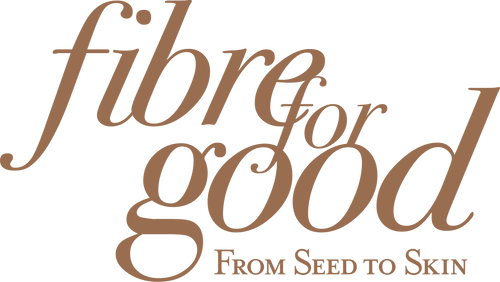
About Us
Fibre For Good was founded to challenge the waste and harm caused by the fashion industry — from overproduction and toxic chemicals to the misuse of vital resources like water. We offer a better way.
Our garments are made using Organic Natural Colour Cotton (ONCC), grown from heirloom seeds through regenerative farming, hand-picked, and crafted without any wet processing. No dyes, no bleaches — just nature at its best.
Because the crop is rare and yields are limited, the result is one of the most luxurious, sustainable fabrics on the planet. We’re here to offer truly responsible choices, and a gentler footprint on the earth — one garment at a time.
Not all cotton is created equal
The cotton in most commercially made garments is genetically modified to produce higher yields and whiter fibres. Unfortunately, this modification also reduces the natural softness of the cotton.

1. Chemicals
Commercially produced cloth is subjected to a laundry list of chemicals and, quite literally, swimming pools of water are used in production. Organically grown cotton products are thankfully becoming more mainstream. Some are even coloured using plant-based dyes. Regardless of how ‘green’ these dyes are, the cloth still needs to be stabilised and made colourfast using bleach and other chemicals.
2. Impacts on environment
Contaminated water often returns to waterways post-production, endangering the health of not only the environment, but all the creatures (including humans) who live in it.

Organic Natural Colour Cotton. Why is it better?
Fibre for Good Organic Natural Colour Cotton (ONCC) grows in three naturally occurring colours, so it doesn’t need bleaching or dying or chemicals added to make the fabric colourfast. In fact, ONCC fabric has a tendency to deepen in colour over time.


Mother Nature is entirely responsible for the colours of our cotton. The strength of the cotton colour can be a bit like the vintage of a wine, affected by a range of growing conditions. That’s why our garments may have minor hue shifts and a subtle ‘marle’ look – and why we say that they come in ‘shades’ of Winter White, Sage and Wheat.

The super softness of organic natural colour cotton is due to it’s hollow core, which is able to absorb moisture, breathe and protect baby’s skin. Minimal processing of our cotton allows it to retain that softness plus natural hypoallergenic and anti-static properties, making it healthier to wear.

Very little water is required to cultivate this drought resistant cotton. The only time water is used during processing is when the fibre is washed after harvest. This equates to a water saving of 80-90% when compared to commercially produced cotton products.

Our cotton is hand-picked and grown from non-modified seeds, descended from plants thousands of years old. For generations, our farmers have saved the seeds from harvested cotton to sow for the next crop. Separated cotton fibre is made directly into thread and cloth.

Another advantage of minimal processing and no genetic modification is fibre integrity. With proper care, our products will last well after bub has outgrown them and be in good condition for future siblings!

Our farmers
Fibre for Good cotton grows in northern China, within the fertile Hexi Corridor, a string of oases on the northern edge of the Tibetan Plateau. Cotton and other goods from this region have been traded via the ancient ‘Silk Road’ since 200BCE.
The soil here is fertile and the sun is strong, shining up to 14 hours per day. The climate is dry (it hardly ever rains) and water, if needed, is found in ancient aquifers.
Our farmers have been continuously farming here for 13 generations, passing down knowledge and techniques from father to child. They farm regeneratively, using the landscape and their own livestock to manage pests and fertilise the soil.
Cotton crops are rotated with food crops to diversify the make-up of the soil. After it is harvested by hand, the cotton is processed on location where the seeds are separated from the cotton fibre. The farmer keeps the seeds to be used for the next planting and the cotton fibre is taken away to be spun into cotton thread.
Livestock are encouraged to eat the remains of the cotton plants in the field. Anything left over is turned back into the soil – along with the natural fertiliser left behind by the feasting livestock – locking carbon dioxide and other rich nutrients into the soil.
Each year, before our farmers begin to sow, we agree on a price up front for the future crop, and pay them 50% to cover cultivation costs and ensure their family has money to live on. Once the harvest is in, we pay the balance. If the season is poor and the crop is less than expected, there is no penalty. We know that if we look after our farmers, they will look after us.
Although an ONCC crop is nearly three times more expensive per tonne than commercially grown and harvested cotton, the end product is high quality, 100% organic, 100% chemical free and our farmers are happier and healthier – both physically and mentally – than the average commercial cotton farmer.
In time, our hope is that more consumers will endorse products with responsible supply chains, encouraging retailers, manufacturers and growers to think more about striking a sustainable, ethical balance between process and profit.
Paying a few dollars more for a better, healthier, sustainable product today may lead to a better life for exploited souls around the world in the future.
